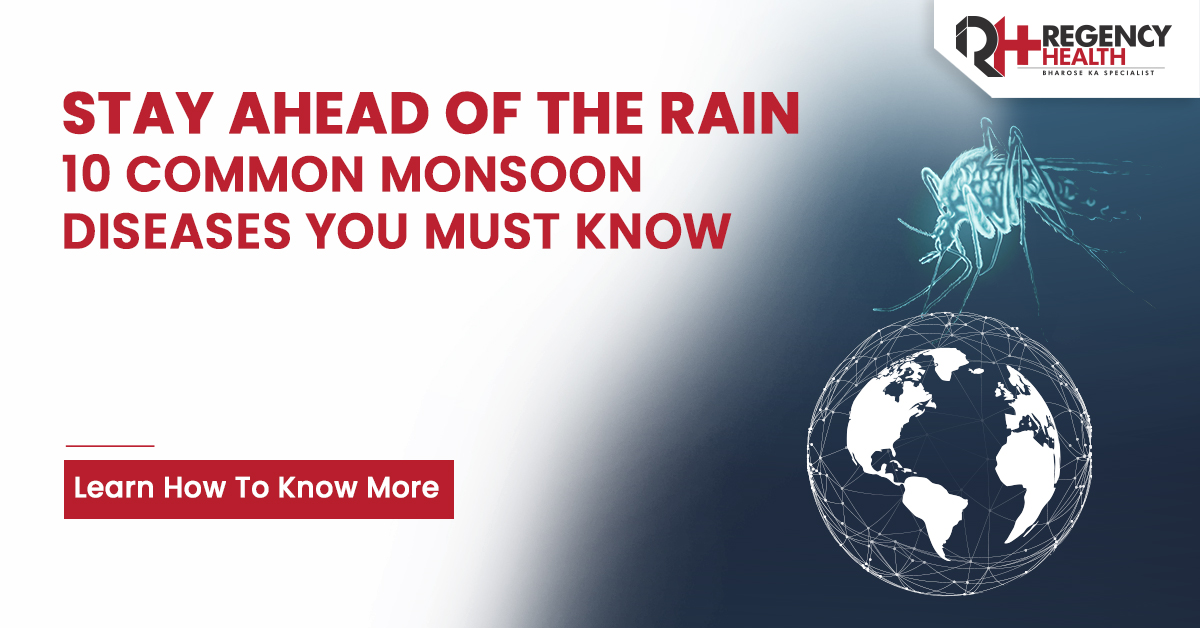
Monsoon is a welcome relief from the long hot and humid months of summer. However, these much-awaited rains bring with them some monsoon diseases that can make life miserable for you. There are a variety of illnesses, some of which might be fatal, ranging from malaria to cholera, dengue to even chikungunya which needs to be contained at the earliest.
Every year, different mosquito types are born and they might start a string of diseases in the rainy season. There are various homemade remedies as well as scientific and medical techniques to make your home a mosquito-free zone.
So, let’s go through 10 typical monsoon ailments and how to effectively prevent them to avoid sickness.
10 common monsoon diseases
- Malaria
The main factor causing malaria spread is the Anopheles mosquito. The monsoon season is when this parasite begins to reproduce. Water logging is a contributing factor to malaria and acts as a major breeding ground for Anopheles. Malaria is one of the most prominent monsoon illnesses that can induce a severe fever pushing the body temperature to 105 degrees Celsius. Body chills, discomfort, and a high fever are a few of the notable symptoms of malaria.
- Dengue
Dengue is the most common monsoon disease caused by tiger mosquitoes. High fever, a low platelet count, rashes, and hypersensitivity are some of the signs of dengue. To protect yourself from this disease, use insect repellents and plants that repel mosquitoes, such as citronella. In addition to this, wearing clothing that completely covers your body would help.
- Chikungunya
Aedes albopictus- a type of mosquito is known as the main spreading agent of Chikungunya. These lay their eggs in stagnant water found in air conditioners, refrigerators, plants, utensils, and water pipes. The mosquitoes transmit this illness by biting a person. The two most common symptoms of chikungunya are fever and joint pain.
- Cholera
One of the most common diseases in the rainy season, Cholera is caused due to consumption of contaminated food and drink. Poor sanitation and unhygienic living conditions are some of the main reasons for cholera. The most common symptoms of this monsoon illness are loose stools and diarrhea.
- Typhoid
Typhoid is a water-borne illness that is often brought on by poor sanitation. This includes consuming food and drinks prepared or stored improperly. The S. Typhi bacteria carries typhoid. Typhoid has many symptoms, including fever, headache, weakness, discomfort, and sore throat.
- Viral Fever
Viral fevers are a common occurrence all through the year, but their frequency gets particularly high in the monsoon season. High fever, cold, and cough are typical symptoms of this monsoon disease. The duration of a viral fever may last for three to seven days. Before making any self-diagnosis or initiating treatment, speak with your doctor.
- Diarrhea
This intestinal disease is brought on by the widespread consumption of unclean food and water. Diarrhea is a relatively manageable and preventable illness if one takes precautions. The two types of diarrhea that can be treated are acute and chronic diarrhea. Therefore, drinking boiled water and making meals are the simplest ways to prevent this condition.
- Leptospirosis
Weil’s disease, also known as leptospirosis, is spread by contact with contaminated water or muck. Leptospirosis is a bacterial disease that can be transmitted from animals to people. Several animals introduce the organism into the land and water through their urine.
- Stomach Flu
Viral gastroenteritis is another name for stomach flu. It is an infectious disease that affects the intestines as well as the stomach. Consuming unhygienic food and beverage products might cause stomach diseases, which are common during the monsoon season.
- Influenza
The usual causes of Influenza include changes in temperature and the weather. Since this condition can spread virally from one person to another, you must take precautions to prevent it.

 Call-an-Ambulance
Call-an-Ambulance



